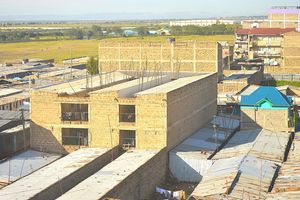
A section of an aerial view of Njogu-ini estate, Athi River township.
At least 5,000 homeowners in Mavoko, Machakos County, face imminent eviction from Kenya Meat Commission (KMC) land, as fresh details emerge about the pain and despair of families whose dream of property ownership is now under threat.
At the centre of the saga is the now-defunct Mavoko Municipal Council, with pensioners and other unsuspecting investors caught in the crossfire.
According to affidavits filed at the Machakos Environment and Land Court, the dispute dates back to 1997, when El Niño rains led a group of landless Athi River residents to occupy undeveloped land next to the KMC factory.
At the time, the occupation went largely unnoticed – KMC had collapsed in 1991, leaving the state-run meat processor a ghostly shell. Though revived in 2006 under President Kibaki, the land remained mostly idle.
In 2005, the occupiers – of land now known as KMC Phase III – sought formal allocation from Mavoko Municipal Council. They applied to regularise their occupation and subdivided the 164-acre parcel (LR No 10281), excluding four acres reserved for roads.
On May 7 2005, the council’s Town Planning, Housing and Markets Committee approved the application, and on August 6, 2007, letters of allotment were issued, boosting investor confidence.
Mr John Mwati, 67, a retired teacher, told Saturday Nation that the original squatters put up temporary structures before selling the land to developers, turning Njogu-ini estate into a bustling residential zone.
“The group subdivided the land among themselves. It became the goose that laid the golden egg,” he said. “Local councillors and their political allies benefited.”
Today, the estate is home to around 100,000 residents, with three public schools, private institutions, permanent homes, rental units, electricity, and sewer lines.
On May 23, 2018, KMC informed the court (Case No 227/2017) that the land had been under leasehold since July 1, 1964 for a term of 85 years and 8 months, and had a legal charge in favour of National Bank of Kenya from 1985.
Fearing eviction, Kelvin Nzioki and 53 others filed a suit in 2017, seeking ownership through adverse possession and a permanent injunction against demolitions.
The eight-year legal battle, however, exposed the irregular issuance of allotment letters under the repealed Trust Lands Act and Government Lands Act. On July 10, 2024, Justice Annette Nyukuri ruled that the town clerk lacked authority to issue the letters, dismissed the case, and ordered the plaintiffs to vacate LR Nos 18474 and 10281 within 90 days.
“The plaintiffs, their employees, servants, agents, tenants, and relatives are hereby ordered to vacate...within 90 days,” the ruling stated. “In default, eviction shall issue.”
Tension grew as locals awaited eviction. In May 2025, KMC, now under Kenya Defence Forces (KDF) management, issued a 14-day vacation notice expiring May 21. The notice, copied to local authorities, triggered panic among landlords and tenants.
On May 9, five landowners, through advocate Anthony Chege, moved to court seeking to stop the evictions. On May 12, the court directed Machakos County Government and KMC to respond within 14 days. A hearing is set for July 22, 2025. No orders halting evictions have been issued.
On Friday, May 9, five landowners, through their advocate Anthony Chege, filed an application at the Machakos Environment and Land Court before Lady Justice Anne Koross. The court gave directions on May 12, ordering the Machakos County Government and KMC to file their responses within 14 days. The inter-partes hearing was scheduled for July 22, 2025. No court order has been issued so far against the evictions.
Built without title deeds
Some residents believe political interests may have played a role in the land allocations. Multiple court filings and resident testimonies cite involvement of local leaders who allegedly facilitated the subdivision of the land without following due process.
“There were vested interests from the start,” said a resident familiar with the early settlements. “It was an open secret that some councillors and influential figures owned multiple plots.”
For years, developers continued to build without title deeds, relying solely on the allotment letters issued by the municipal council. While some were aware of the legal grey area, the growing population and the presence of schools and infrastructure created a sense of permanence.
“We assumed if there were any issues, they’d have been resolved long ago,” said Ms Mary Nduta, a landlord with six rental units.
Others pointed fingers at government agencies for their inaction over the years.
“Why didn’t KMC raise objections when we were putting up homes and schools?” asked a local pastor whose church now faces demolition. “We’ve been paying county levies, connecting to the national grid, and following regulations, only to be called illegal now.”
The Kenya Defence Forces, which took over KMC in 2021, has remained firm on reclaiming the land. Sources familiar with the matter said the military views the property as strategic and is under pressure to clear encroachments before embarking on new development plans.
The Ministry of Lands is yet to comment publicly on the matter, though insiders say internal investigations are ongoing to establish how the now-defunct municipal council processed the allotments and why national land agencies failed to act sooner.
Officials from the National Land Commission were seen visiting the area in early June, but residents say no official communication has followed.
Human rights groups have called on the government to explore compensation or resettlement options.
“Mass eviction without a proper relocation plan could trigger a humanitarian crisis,” warned Ms Ann Atieno, a lawyer with the Centre for Social Justice. “Many of these families are low-income earners who put their life savings into these homes.”
On May 13, as tenants began to move out, homeowners met KMC boss Major General Jattani Gulla, alongside Athi River MCA Jeremiah Kaloi, pleading for an amicable resolution.
On May 20, less than 24 hours before the notice expired, Governor Wavinya Ndeti met KMC leaders and brokered a one-month extension.
On May 22, KMC issued a new notice acknowledging the county’s role in mediation and tenants who had vacated.
Mass tenant exodus
“Take notice that upon further consultation with the county leadership, the Commission hereby extends the notice period... for a further thirty days from May 22, 2025,” read the notice pinned across Njogu-ini estate.
The new deadline is June 21, 2025.
A Saturday Nation spot check this week found the estate partly deserted. Many rental and commercial units stood vacant, with mass tenant exodus reported. Single rooms now go for Sh2,000 monthly, and one-bedroom units for Sh6,500–7,500.
Roadside kiosks were mostly closed, a sign of slowed activity. A drying open drain marked the downturn. Stray, hungry dogs roamed the area. Locals eyed strangers warily, unwilling to speak without local administrator consent.
Mr James Wambua, the sole remaining tenant in a 12-room iron-sheet house, said crime was rising in the area.
“Criminals are taking advantage. Burglary and mugging are now common. Vacant houses are soft targets,” he said.
At Brightest Star Academy, a private school with over 500 learners, classes continued as normal.






